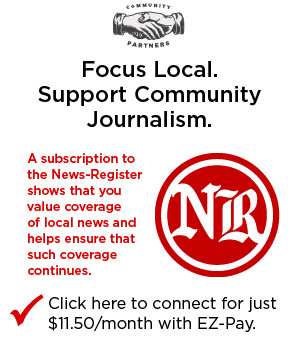Tom Henderson: We the media
Wolf Blitzer never showed up. Neither did Anderson Cooper.
One would think Sean Hannity or Megyn Kelly would drop by, if only to interrupt the speakers. Nope. Even the Portland television boys couldn’t spare one lousy helicopter.
Paul Anderson was right: The George Fox University professor predicted the media would fail to cover his discussion of religion and violence March 31. And he was right.
The media never appeared.
I was present, but that doesn’t count. I am not the media.
I am not even the News-Register. I am a reporter for the News-Register. The News-Register is not a person. It is 7,000-circulation semi-weekly newspaper. But that’s OK, because you know what? The media is not a person either.
That statement might surprise you. A lot of people talk about the media as if it were one guy. Even people who will tell you repeatedly that corporations are not people will talk about how the media thinks this and the media thinks that or acts in unison as if it were The Borg from “Star Trek.”
In reality, the media is not even a singular noun. It is properly plural. Remember that the next time you hear someone say the “media is.” They are not only guilty of a sweeping generalization, but also poor grammar. Unfortunately, both sins are pandemic during election years.
Rarely do I turn to Facebook and not find a reference to media conspiracies against various candidates. Bernie Sanders campaigned in Vancouver last month. Not that the media cared. Journalists are reportedly waging a campaign of silence against Sanders. Were it not for a sparrow landing on Sanders’ podium, the following Portland rally would have been entirely ignored.
Katie Gillespie would disagree. She works for the Vancouver Columbian. She spent an exhausting day covering the first rally. Then she did the whole thing over again for a Clinton rally. My brother-in-law, Al Byers, is an assignment editor for KGW. He has had a similarly busy election year. It’s true that CNN crews rarely show up. State and national candidates make the same stump speeches over and over and over again.
They are not going to draw national press attention ... unless a stray bird is involved.
It doesn’t matter. Those national folks are not the media any more than Katie, Al and I are the media. However, if you want to be technical about it, we are more the media than those other people.
All the gripes about the media are generally targeted at the major broadcasting outlets and occasionally large newspapers such as The Washington Post or The New York Times. Most journalists don’t work for those organizations.
Most journalists, most people employed by “the media,” are not Clark Kent or Lois Lane. They don’t work for The Daily Planet. They are more like Michelle Longworth, who covers local government for The Metropolis Planet, the weekly paper in Metropolis, Illinois (population : 6,500).
Then there is Mary Stone of The Tribune in Lewiston, Idaho (population: 30,000), Tim Blair of the Times-Democrat in Piggott, Arkansas (population: 4,000), Nathan Oster of the Standard in Greybull, Wyoming (population: 2,000) and Emily Mentzer of the Itemizer-Observer in Monmouth (population: 6,000).
America has some 1,476 daily newspapers. However, there are more than 6,579 weekly and semi-weekly newspapers. Even allowing for the sizes of staffs and circulations, that still means that most journalists work for small newspapers — most of them for wages that make them wonder if they have careers or self-inflicted wounds.
They really don’t have the time or energy to launch, let alone maintain, conspiracies. They are also extremely objective.
I have worked for more than a dozen newspapers in the last 35 years. Some of my colleagues have been conservative, others liberal. The vast majority have been flaming moderates. I am hard-pressed to remember even one who has not been obsessed with objectivity and fairness.
Someone recently told me the media always paints Trump supporters with the same brush. Really? Always? Here in the media, we know the feeling.
Of course, I can only speak for myself.













Comments
David Bates
Speaking for myself, I enjoyed this piece immensely, and it prompted me to dust off my 1985 edition of Edward Jay Whetmore's "Mediamerica: Form, Content and Consequence of Mass Communication." Recalling a Viewpoints piece I once wrote arguing that political terms like "liberal" and "conservative" had become basically meaningless (even more true today than then), it occurred to me that "media" is similarly misleading.
If we go with Whetmore's definition of "mass medium," ...
1) It must reach many people, and ..
2) It requires the use of some technological device, located between source and destination
... then "the media," refers to: Newspapers, magazines, journals, newsletters, radio broadcasts, cable TV broadcasts, books, films, and now: the Internet, which includes blogs, podcasts, message boards, YouTube, Instagram, Facebook, Twitter, RSS feeds, etc.
It actually doesn't help much anymore to clarify by saying "the news media." It's never entirely clear what this means. Just the major newspapers, just the major TV broadcasts ... or both? Or: The opinion-pages in said newspapers, or the pundits on said TV stations? Sean Hannity and David Corn may blast "the media," and -- amazingly -- they may even be referring, in their own minds, to the same media. But to listen to their specific complaints, one would think they're talking about species as different as a dolphin and an elephant.